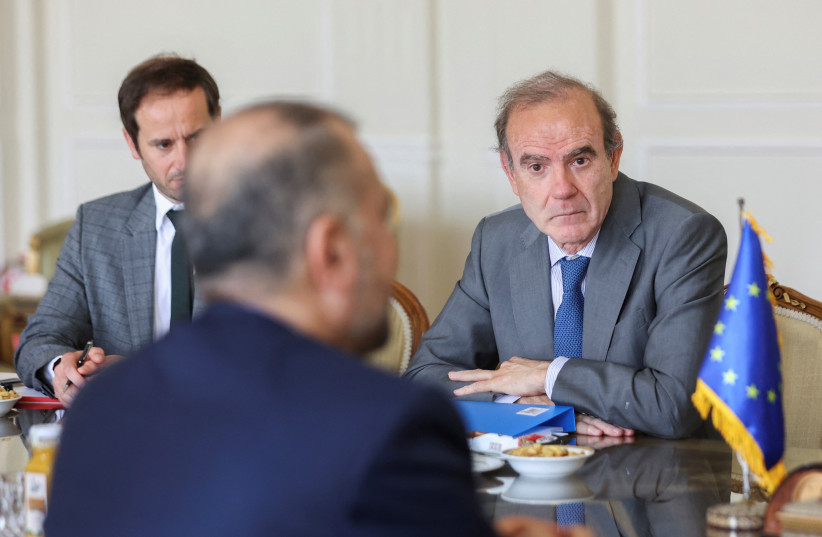US envoy Rob Malley and top Iranian negotiator Ali Bagheri Kani were set to depart for Vienna on Wednesday for the resumption of indirect nuclear talks, while Washington sought to lower expectations for a final deal.
The negotiations set to begin on Thursday will be the first talks on reviving the 2015 Iran nuclear deal since a failed attempt to break a months-long impasse in Doha in June.
“The United States welcomes EU efforts and is prepared for a good faith attempt to reach a deal,” Malley said. “It will shortly be clear if Iran is prepared for the same.”
“There will be a discussion and exchange of views... including the ideas presented by the Islamic Republic of Iran,” said Iranian Foreign Ministry Spokesman Nasser Kanani.
The Iranian Foreign Ministry Twitter account added that Kanani “expressed hope that the other parties will take the necessary decisions and seriously focus on solving the remaining issues to advance the condition.”

What happened in June?
Negotiations came close to a conclusion in March, but Iran made additional demands, such as ending an International Atomic Energy Agency investigation into undeclared nuclear sites, and removing the Islamic Revolutionary Guard Corps from the US Foreign Terrorist Organizations List, which the US has refused to do.
The State Department said that the US has “been prepared to close a deal and immediately begin reimplementation based on the outline on the table since March.”
The EU’s final proposal is based on that text from March, the State Department said, and the resumption of talks in Vienna is meant to see if a deal can be closed based on that text.
“In order to reach a deal, Iran will have to drop demands that are extraneous to the JCPOA,” said the State Department spokesman. “We hope that will be the case, though at this stage our overall expectations remain low. Nonetheless, we have positively responded to [EU] High Representative [Josep] Borrell’s invitation as we believe it is important to support his efforts.”
The US left the nuclear deal in 2018, and started negotiations to return to it after Joe Biden was elected president. Iran began enriching uranium far beyond the JCPOA 3.25% limit starting in 2021, reaching 60% enrichment this year. Weapons-grade uranium is enriched to 90% purity.
The deal also addresses IAEA monitoring and inspections, which Iran has repeatedly disrupted, most recently shutting off the agency’s cameras at nuclear sites.
European Union Deputy Secretary-General Enrique Mora, the go-between for the US and Iran – which refuses to talk directly to the Americans – tweeted that the talks will be “on the basis of the [EU] coordinator’s text tabled on 20 July.”
Are we running out of time? <br>
EU High Commissioner for Foreign Affairs Josep Borrell, coordinator for the talks, wrote in the Financial Times last week that he has offered a final proposal, and talks must come to a close as soon as possible.
“After 15 months of intense, constructive negotiations in Vienna and countless interactions with the JCPOA [Iran deal] participants and the US, I have concluded that the space for additional significant compromises has been exhausted,” Borrell wrote. “Decisions need to be taken now.” Rejecting the deal would “risk a dangerous nuclear crisis, set against the prospect of increased isolation for Iran and its people.”
Knesset Foreign Affairs and Defense Committee chairman Ram Ben Barak accused Iran of trying to “buy time” in Vienna.
“I really hope [Western powers] say ‘take it or leave it,’” Ben-Barak told 103fm on Wednesday. “The deal being discussed is not good.”
IAEA Director-General Rafael Grossi warned on Tuesday that Iran’s nuclear program is “moving ahead very, very fast.”
He said that “good words” from Iran are not enough, and transparency is needed.
The talks in Vienna resume as officials and state media in Iran have said in recent days that the Islamic Republic has the capability to build a nuclear weapon.
Iranian Atomic Energy Organization head Mohammad Eslani told the Fars news agency on Monday that his country has the technical ability to build an atomic bomb, but it does not plan to do so.
Also this week, the US imposed sanctions on firms in China, Singapore and the United Arab Emirates for helping sell tens of millions of dollars in Iranian oil and petrochemical products.
Reuters contributed to this report.
